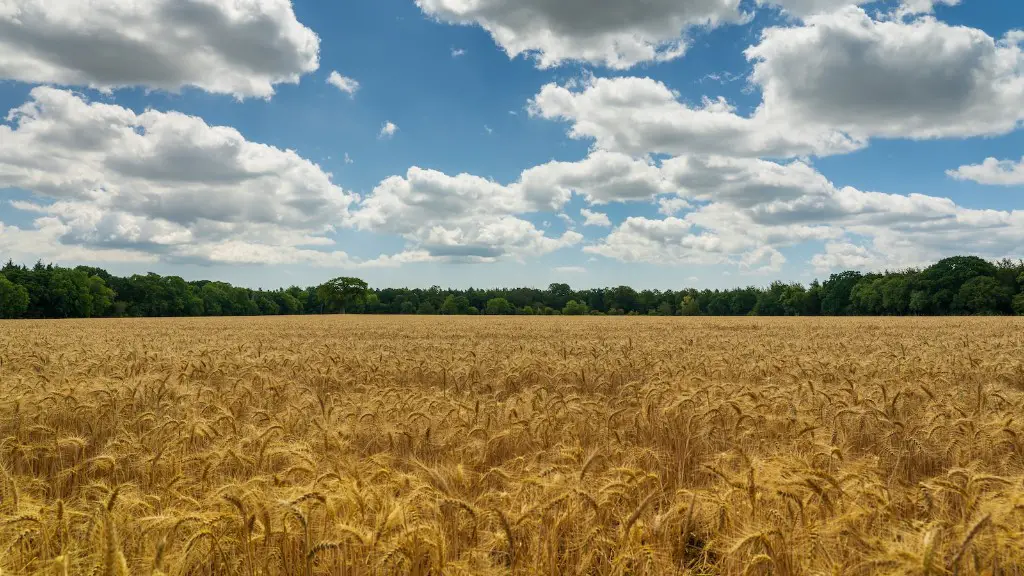The role of pH in agriculture is crucial in order to maintain optimal soil conditions for plant growth. pH affects many soil properties including nutrient availability, soil structure, and microbial activity. For example, nutrient availability is affected by pH because it alters the forms of nutrients that are present in the soil. Additionally, soil structure is affected by pH because it can influence the way that soil particles interact with each other. Lastly, microbial activity is affected by pH because it regulates the growth and activity of microorganisms in the soil. All of these factors are important in agriculture because they can impact plant growth and yield.
pH is important in agriculture because it is a measure of the acidity or alkalinity of a solution, which can affect the growth of plants.
What is the importance of pH in agriculture?
The soil pH is a measure of the acidity or alkalinity of a soil. It is defined as the negative logarithm of the hydrogen ion concentration in soil. The soil pH is an important factor in plant growth and soil fertility. The optimum pH for most plants is between 6 and 7. Soils with a pH below 6 are considered acidic, while those with a pH above 7 are considered alkaline.
Most soils in the world are naturally acidic, with a pH below 7. This is because soils are formed from the weathering of rocks, which are generally acidic. However, some soils can become alkaline due to the addition of agricultural lime or other materials.
The pH of a soil can be affected by many factors, including climate, vegetation, land use, and soil management practices. Climate can affect the pH of a soil by influencing the rate of weathering of rocks and the rate of leaching of minerals from the soil. Vegetation can affect the pH of a soil by releasing acids or alkalis into the soil. Land use can affect the pH of a soil by changing the amount of organic matter in the soil or by adding chemicals to the soil. Soil management practices can also affect the pH of a soil.
The effect of soil pH on plant growth is very important. pH affects the availability of nutrients within the soil, and plants have different nutrient needs. For example, the nutrient nitrogen is more readily available in soil when the pH value is above 55. This means that plants will be able to grow better if the soil pH is higher.
What do farmers want pH
A pH of 65 is just about right for most home gardens, since most plants thrive in the 60 to 70 (slightly acidic to neutral) range. Some plants (blueberries, azaleas) prefer more acidic soil, while a few (ferns, asparagus) do best in soil that is neutral to slightly alkaline.
pH is a measure of how acidic or basic water is. The pH scale goes from 0 to 14, with 7 being neutral. pHs of less than 7 indicate acidity, whereas a pH of greater than 7 indicates a base. The pH of water is a very important measurement concerning water quality.
What role does pH play in soil and plant health?
Soil pH is an important factor in determining the availability of nutrients for plant growth. In highly acidic soils, aluminum and manganese can become more available and more toxic to plants, while calcium, phosphorus, and magnesium are less available to the plant. In highly alkaline soils, phosphorus and most micronutrients become less available.
Soil pH has a significant effect on biological and chemical processes and therefore affects nitrous oxide emissions. Early identification of soil pH problems is important as it can be costly and difficult to correct long term nutrient deficiencies. The best way to do this is to test your soils regularly.
What happens to plants if pH is too low?
pH is an important factor in plant growth. A low pH can cause stunted growth, dark green leaves with red, bronze, or purple tinges, brown spots on leaves, and leaf necrosis. These symptoms can be caused by a number of factors, including soil type, water quality, and nutrient availability.
It is essential that dissolved nutrients are available to plants through their roots in order to avoid deficiency and stunted growth. When the media-pH is too high, however, these nutrients become less soluble and unavailable for uptake. As a result, high-pH induced iron deficiency can develop quite quickly, leading to chlorosis of new growth.
Is high pH good for plant growth
The pH range 55-65 is optimal for plant growth as the availability of nutrients is optimal. This range is also optimal for the uptake of nutrients by plants.
Although most plant nutrients are optimally available to plants within the 65 to 75 pH range, this range of pH is not always compatible to plant root growth. In some cases, plants may experience stunted growth or even die if the pH of their root environment is too high or too low. Therefore, it is important to monitor the pH of your soil and take corrective measures if necessary to ensure that your plants are able to thrive.
Which pH do most crops grow best?
The ideal pH for a productive food garden is about 60 to 65. This range is preferred by most food crops, with exceptions for potatoes and berries, which grow best in acidic soil, and asparagus and cabbage, which prefer near-neutral conditions.
Agricultural lime is a common material used to neutralize soil acidity. The finer the limestone particles, the more rapidly it becomes effective. Different soils will require a different amount of lime to adjust the soil pH value.
What is the main function of pH
pH is the measure of how acidic or basic a substance is. In humans, pH balance plays a role in keeping the body functioning optimally. The ideal pH of the body is slightly alkaline, which facilitates certain biochemical reactions like oxygenating the blood.
It is very important for organisms to maintain a stable pH level, as fluctuating pH levels can be very harmful. This is especially true for human beings, as our bodies are very sensitive to changes in pH. For example, blood is normally slightly basic, with a pH range of 7.35 to 7.45. If our body’s pH deviates slightly from this range, we will start to feel sick. Therefore, it is crucial that we do everything we can to maintain a stable pH level in our bodies.
What are the benefits of high pH?
This is great news for people who are looking for ways to reduce their cardiovascular strain. The study found that high-pH electrolyte water can help reduce blood viscosity, which can lead to less strain on the heart. This is a great way to stay hydrated and reduce your risk of heart disease.
pH is an important factor to consider when trying to optimize plant growth. Most minerals and nutrients are more soluble in acid soils than in neutral or slightly alkaline soils. This means that plants grown in acid soils will generally have access to more nutrients than those grown in neutral or slightly alkaline soils. Additionally, the rate of microbial activity is generally higher in acid soils, leading to higher rates of nutrient cycling.
Final Words
understanding ph is important in agriculture because the ph of a soil can directly affect the availability of nutrients to plants. a soil with a high ph may have unavailable nutrients, while a soil with a low ph may be too acidic for plants to grow. by understanding and testing the ph of soils, farmers can ensure that their plants are getting the optimal growing conditions.
pH is an important factor in agriculture because it can affect the availability of plant nutrients, the activity of soil microorganisms, and the turnover of organic matter.





